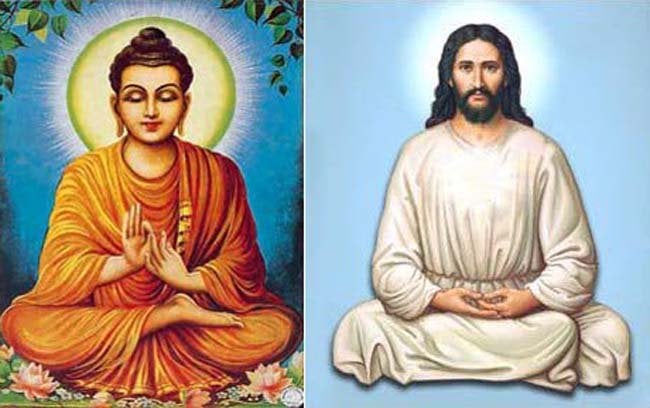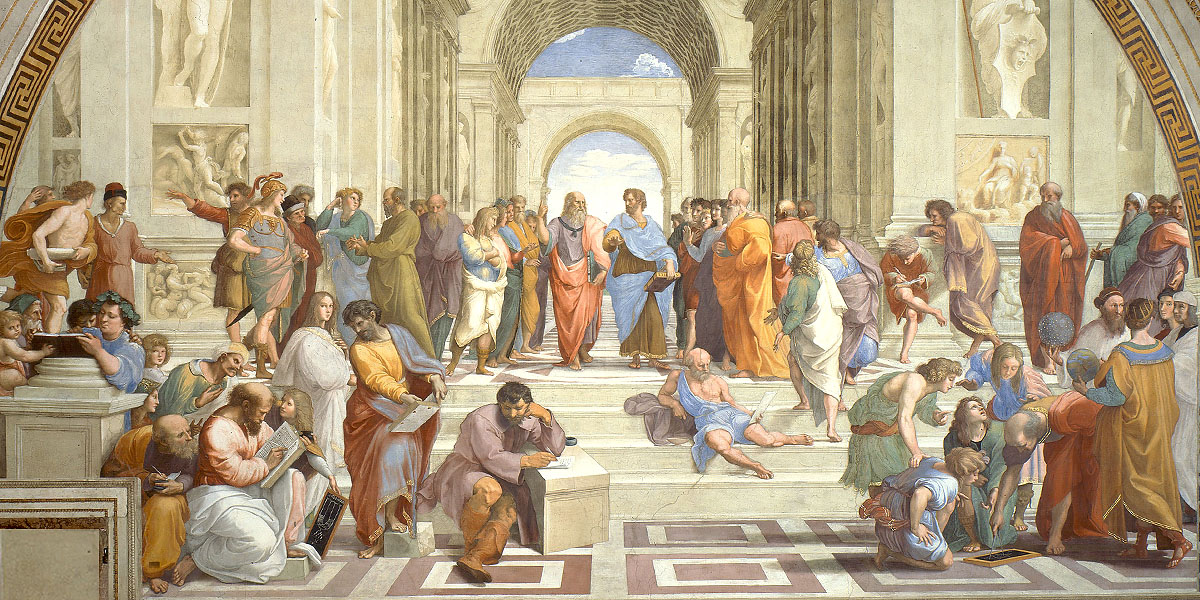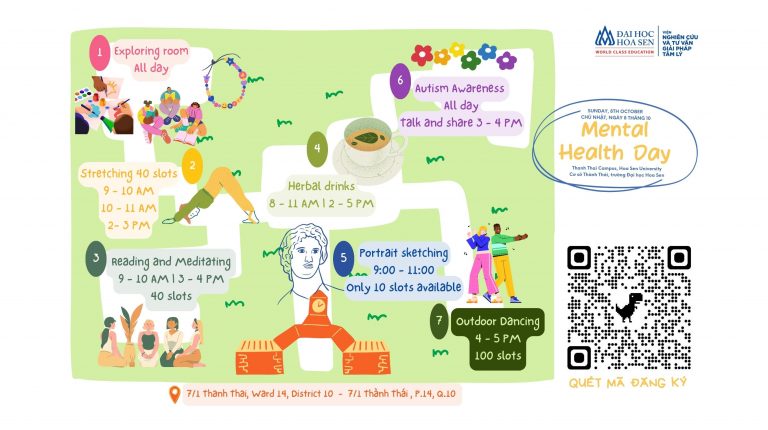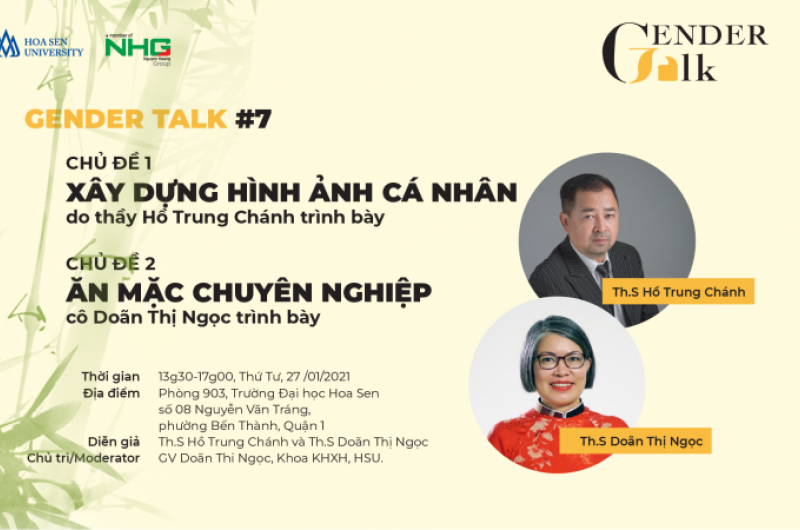HOW TO LEARN PHILOSOPHY? – Sharing by Dr. Duong Ngoc Dung
June 12, 2022
Dr. Duong Ngoc Dung
Director of Philosophy Program, Faculty of Social Sciences, Hoa Sen University
Many students who are interested in philosophy often ask me the following questions:
1-Where should I start to study philosophy?
2-What method to study philosophy?
3-Does studying philosophy require any special talent?
4-Which philosophers, should we focus on?
This article will focus on answering the above questions.
Of course, even practicing massage or cooking requires talent. Because not everyone naturally can relax people’s bodies or prepare attractive dishes. But if you think that philosophy is only for intellectual geniuses and people with special gifts, that is also wrong. It is even more confusing to identify philosophers with crazy, eccentric people who always like to say wild, strange things that no one understands. Buddha, Confucius, and Jesus all spoke very simply, although, from these three great men, three great philosophical and theological traditions were born. Nāgārjuna (Nāgārjuna 龍樹) and Asanga (Asanga 無著), two masters of the Madhyamaka and Mind-Only traditions in Mahayana Buddhist philosophy, also only built their great philosophical system based on the simple saying of Buddha. Of course, the philosophical style of Western philosophers is not easy to understand and is sometimes dark, but the main reason is still the problem of language and culture. For example, German language and cultural traditions have produced the philosophy of Kant, Hegel, Habermas, Gadamer, and Husserl. It was the Chinese language and writing that created and shaped the tradition of Chinese thought, just as Greek influenced the entire operation of Western philosophy. If we live in the Vietnamese cultural tradition and try to speak like Hegel, we are just posing or acting philosophically. Just as the American cultural tradition has produced great philosophers such as William James, John Dewey, Charles Peirce, and now Hilary Putnam, they write in a style that is completely different from the style of German philosophers. more eccentric, closer to everyday language, and rarely hiding behind metaphysical clouds like their German colleagues.

So, what skills do you need to study philosophy? I would like to offer the following comment table for young people to evaluate for themselves. If you find yourself answering “no” to the following questions, then you should happily “clean up your life” and study other subjects to save time and energy:
1-The most basic observation about philosophers is that they love to read books, not necessarily philosophy books, nor specialized books on math or physics. The general attitude of philosophers is to be curious but not interested in practical matters (such as dissections in the laboratory), so they turn all their energies into reading books, reading everything in the world, from the Bible. to Einstein’s theory of relativity. In general, they are curious about everything. Ken Wilber is a typical case. Karl Popper studied physics, politics, and history. If from a young age, you did not like reading books (books in general: novels, literature, poetry, art, religion, etc.) and until now books are still your best sleeping pill, then you should be happy. It seems like you’re saying goodbye to philosophy because you’ll never finish reading a page of a real philosophy book. This is also the top standard for identifying “fake” philosophers: they never read books or only pretend to buy books to fill their cupboards. A passion for reading is a prerequisite for studying philosophy.
2 – The second characteristic of a philosopher is that he likes to argue, analyze, and explain. Because they always read books and think, a philosopher’s understanding and judgment must naturally be sharper, deeper, and more flexible than those who never pay attention to books. But we also need to be careful to distinguish: philosophers like to analyze, argue, and explain, which does not mean that they only skillfully display famous philosophical names without ever giving their opinions. For example, many people open their mouths to cite Derrida, Foucault, Sartre, Merleau-Ponty, and Husserl, all names that make listeners fearful, but they do not know what these famous philosophers said or just understand vaguely. The philosopher does not like “exhibiting goods,” but he likes to argue and explain all issues, and usually he does not accept existing opinions, but always has a skeptical, gentle sarcastic attitude. against anyone’s “firm as nails” assertions. If you find yourself without any opinion: when you were young, you asked your parents, when you went to school, you asked your friends, when you got married, you only knew how to ask your husband (or wife), when your husband (or wife) died, then I ask my son, when he goes to work, he is very obedient and afraid of his boss like his father. When he talks to his friends, he is very “respectful of superiors and subordinates”. Whatever everyone says is right. If you find yourself like that, you should not study philosophy. Studying philosophy only makes you confuse everything and indeed, even if you understand what philosophy is, it won’t help your life, which is too flat. In some ways, a philosopher is a person of real courage, in the sense that he has enough courage and intellectual honesty to oppose views that he believes are wrong or dangerous. Socrates is the model of a true philosopher.
3 – Philosophy is only for people who like to think, are inclined towards an intellectual, introspective, leisurely life, like to sit and read books or like to talk with close friends, so if you are the type of person who is too energetic, who likes outdoor activities and sports, clearly has no talent for studying philosophy. The history of Greek philosophy tells us that Plato was a perfect athlete. But that is an exception: we are not Plato, so we should not imitate to achieve “perfect literature and martial arts” because if we try too hard, we will only be able to become “weak literature and martial arts”, a kind of “philosophy”. Gia Ba Bo” is not like any other zodiac animal.

4-Philosophy is deeply related to language issues, so if you don’t have a specific and serious interest in learning foreign languages, you shouldn’t study philosophy at all. Even books written in Vietnamese to present Western philosophy to philosophy students (by authors Tran Thai Dinh, Le Ton Nghiem, Le Thanh Tri, Kim Dinh, Nguyen Van Trung, and philosophy professors at Van Faculty before 75) cannot be understood if the reader does not have basic knowledge of French literature (or Chinese literature in the case of reading Kim Dinh’s books) because the authors present all rely on French and Chinese sources. Most of these sources can be translated into Vietnamese. Learning Chinese philosophy is less painful because common terms such as Dao, Reason, Qi, Mind, Humanity, Righteousness, Righteousness, Fame, etc. have been vietnameseized for a long time, so in the early stages it is not necessary to know Chinese characters. The reason Indian philosophy could not develop in Vietnamese culture was due to the main obstacle being the Sanskrit language and the too strange thinking style of Indian philosophers, focusing on discussing the Absolute Entity (Brahman) rather than when looking at people, society, and politics, while these are the main concerns in Chinese and Vietnamese thought.
In general, the standards for studying philosophy are just that. With above-average intelligence, and the patience to learn the relevant foreign languages, no need to be a genius, anyone can become a philosopher. Mencius and Xun Zi in the Confucian tradition also affirmed that anyone can become a saint. Chinese Zen masters all affirm that anyone can become a Buddha. The difficulty begins with how we must learn philosophy when we start learning philosophy because philosophy itself has a system and tradition, we cannot rush into anyone. certain philosophy books, such as Heidegger’s work Being and Time (Sein und Zeit) (especially read Tran Cong Tien’s translation), then you will be so disappointed that you will have to jump back, carrying your heart with you. Endless hatred of philosophy. Philosophy students all admit that the biggest initial difficulty is the problem of technical terminology. These technical terms themselves come from extremely one-sided translations and lack concepts in English, French, or German, thus adding to the confusion. For example, the word “being” in English (être in French or sein in German) is translated into Vietnamese as “being” or “being.” No one knows what “being” is, but if you know a foreign language, the difficulty will be halved. We will vaguely guess that “being” or “être” is related to sentences in which these two terms are used as verbs: I am a student or Je suis un homme (I “am” a man). Thus “being” or “être” refers to the state of “being,” the state of “existence,” the state of “existence.” I “am” a student, which means I “exist” as a student. A philosopher studies this “existence” (beingness Existenz) in all its aspects.
Thus, one of the first conditions for studying philosophy is to learn a foreign language. It should be noted that most famous philosophers in the history of philosophy were gifted in foreign languages. We can explain that because philosophers are all exceptionally intelligent people, learning foreign languages well is normal for them. It does not seem to be like that. Philosophy is related to language at a very deep level, so much so that Heidegger had to say: “The most important ultimate task of philosophy is to preserve the power of the most primitive languages in which Nature express themselves, and keep common sense from flattening them into total incomprehensibility, which is ultimately the source of all artificial problems.” ( am Ende das Geschäft der Philosiphie, die Kraft der elementasten Worte, in denen sich das Dasein ausspricht, davor zu bewahren, dass sie durch den gemeinen Vestand zur Unverstaendlichkeit nivelliert werden, die ihreseits als Quelle für Scheinproblem fungiert ). Wittgenstein wrote that “The limits of my world are the limits of my language “. When thinking, we all move within conceptual categories established by language, so philosophers’ arguments revolve around clarifying the meaning of certain terms (such as the use of tenses). , how to use prepositions, and combine grammatical structures in sentences…), so it can be affirmed that the first step to learning philosophy is learning pure language. It is not necessary to learn the correct language belonging to a particular philosophical tradition (for example, you must learn Chinese if you want to study Eastern philosophy) because learning a foreign language is the practice of essential analytical skills. necessary for studying philosophy, not for other purposes.
Another common event is that due to a lack of knowledge of foreign languages, many people argue or misunderstand a certain statement. For example, many Christians (generally both Catholic and Protestant) have argued about the most important message in the New Testament: the kingdom of God (regnum dei). One point, based on the Gospel according to Saint Mark (1.14), is that the kingdom of God has come and has been established in the present. The second view is that the Kingdom of God will be established in the very shortly. But the Greek verb Mark uses êggiken is a verb that describes an action that started in the past and is moving toward the future, that is, an event that is not yet completed. Thus the kingdom of God (Hebrew: basileia tou theou ) is near and people can respond to that good news (Gospel). Perhaps the main problem is not that the Kingdom of God will come very shortly, but the heart of the problem lies in people’s attitudes and reactions to the appearance of the Kingdom of God: belief or denial abandonment, apathy, etc. The verb êggiken does not indicate that the kingdom of God has arrived (has arrived) or is at hand (to be at hand) as popular English translations do.
Many scholars also believe that the first Christians were baptized in water (immersion). But in the Bible, the Greek noun used is êdsti or ên êdsti which means “using water, with water“, not “in water“.
Please cite another example. METANOIA in Greek μετάνοια means “a transformation of the heart ” or specifically “spiritual conversion“. In ancient Greek METANOIA simply means “change of opinion/opinion about something.” In the King James Version, the verb metanoeo /μετανοέω is (erroneously) translated into English as “repent/repent/repent= REPENT.”
New Testament translations into English all agree on using the word REPENTANCE (=repentance/ repentance) for both METANOIA and METAMELOMAI. In the Gospel of Saint Mark, Jesus announced that the Kingdom of God was near and asked everyone to repent. METAMELOMAI also has an additional meaning ( connotation ) which is “pain, sorrow, and regret”. In early Christian communities, METANOIA was used consistently to mean “a radical change in thinking and action,” very similar to the concept of SHIFTING IN CONSCIOUSNESS-ONLY BUDDHISM. In 2006 a group of scholars in the ecumenical movement published a study on repentance in the Bible and the Church. This study confirms that at the time of Jesus Christ, Jewish culture still believed that METANOIA (=which today we translate as REPENTANCE/ REPENTANCE) only meant “a radical change in thinking and behavior.” “move” only. According to scholar David N. Wilkin (Millennium Web Catalog of Virginia seminary): “The Latin Fathers translated METANOIA as PAENITENCIA (=this word means REPENTANCE). The father of Western theology, Tertullian, himself objected to the translation of the Greek METANOEO into Latin PAENITENTIAM AGO. The saint said that “in Greek, METANOIA is NOT A CONFESSION OF SIN BUT A CHANGE OF SOUL.” The English term “Conversion” (from the Latin root conversiōn-em = to turn around) accurately describes the meaning of the word METANOIA rather than REPENTANCE (PAENITENCIA). Thus we see a rather interesting similarity: METANOIA approaches āśraya-parivṛtti (=TRANSFORM Y) in the Consciousness Only philosophy of Buddhism. According to Consciousness Only Studies, Alai Da Consciousness is the eighth consciousness, the final consciousness, and the foundation for the remaining seven consciousnesses. For the moment, imagine this CONSCIOUSNESS as a giant tank containing many karmic seeds serving rebirth in samsara. There are many different seeds because they have been accumulated and collected here for countless lifetimes, but roughly include two main types: PURE and IMPERFECT. PURE (GOOD) seeds, when the right time is right, will grow into good RESULTS for the beneficiary, while BAD (IMPURE) seeds will of course create the cause for evil results right in this life or in another life. future birth. TRANSFORMATION is to probe to the bottom of this CONSCIOUSNESS to correct it at its root: REMOVE BAD SEEDS FROM THE MIND, like installing powerful anti-virus software on the computer, and restoring operating functions. machine efficiency. The beautiful expression of American Zen masters is “turn the light around and shine it on yourselves” (turn the light around and shine it on yourselves). AFTER HAVING ILLUMINATED ALL THE DARK CORNERS OF THE MIND CREATED BY IGNORANCE, THE MEDITATION UNDERSTANDS THAT ALL PHENOMENOLOGIES THAT CAUSE DISTURBANCE IN LIFE ARE ONLY DUE TO THE CHANGES OF CONSCIOUSNESS WHEN REACTING TO EXTERNAL ENVIRONMENTS. The main practice for changing the robe is MEDITATION and practicing the principles of Buddhist precepts in daily life. Through the practice of meditation, the MIND (CONSCIOUSNESS) will go through a process of screening, cleansing, and removing all impure seeds stored in the stored consciousness for eons. If you choose to practice according to the Pure Land method, through reciting Amitabha Buddha’s name and visualizing the Buddha’s good appearances, you can also reach this goal AFTER being reborn in the Pure Land.
Mastering a foreign language is therefore indispensable when studying ancient texts. For example, professors who teach Chinese philosophy or scholars who write books on Chinese thought often start immediately with Confucian thought and Confucianism. Sometimes they start with the Xia Shang and Zhou dynasties and analyze pre-Confucian works such as Kinh Thi, Kinh Thu, and Ta Truyen, considering them to belong to historical records rather than philosophical texts. That’s why they don’t know that the character 仁 used in the Book of Poetry does not mean “kindness” as in later Confucian thought, but actually refers to the physical beauty of men and is even used to describe men. The characters are not at all virtuous and compassionate [See Takeeuchi Teruo, “A Study of the Meaning of Jen Advocated by Confucius,” Acta Asiatica 9 (1965), 57- 77). Reading Ta Truyen, we see that the word used to refer to hunting is also used to refer to the attack of an army. Thus, in the perspective of the Spring and Autumn Warring States period, hunting was a form of war and vice versa. In general, a deep awareness of the issue of language is the first gateway to philosophy. Without understanding the language in which ideas express themselves, we stop copying and repeating pre-fabricated conventional ideas in textbooks. I even dare to assert that reading ten books on Confucian political thought is not as useful as spending an hour studying Chinese to see that the word “chinh” 政 in “politics” is closely related to “politics”. ”正= uprightness refers to personal morality. Politicians must have personal ethics, which is obvious in the context of East Asian civilization, but not obvious at all in the history of Western politics.
After our foreign language level is relatively stable, we will begin to study philosophy systematically by finding an “introduction to philosophy” book that is easiest to read. According to personal experience, books of this type written by American authors are the best: presented neatly, orderly, systematically, and especially clear and easy to understand. Even if your long-term goal is to study Chinese or Indian philosophy, you should start with an “introduction to Western philosophy” first. It’s like practicing the necessary skills before climbing higher mountains. Never misunderstand that philosophy is only for eccentric or crazy geniuses.

Philosophy is a serious subject like all other subjects and also requires a clear systematic and hierarchical study. We should not be too hasty or just want to keep up with intellectual fashions by uselessly cramming the works of Heidegger, Sartre, Husserl, Foucault, Habermas, and Gadamer into our heads. If you start studying philosophy with German authors like Hegel, Heidegger, and Husserl, you will go crazy and never want to pick up a philosophy book a second time. We should not start right away with the French authors of the 1968 generation such as Foucault, Derrida, Bourdieu (the most famous French socialist today), Lacan, Barthes, Althusser, Lévi-Strauss, because they deny, criticized, and destroyed all previous philosophers, especially Derrida, destroying the entire tradition of Western metaphysics. But we should not start in chronological order like some textbooks often do because if we do that we are forced to start with the pre-Socratic Greek philosophers and will be bored when we realize that they are not the same philosophers. If the professor is someone who studies Greek philosophy, it will be extremely embarrassing to inform students that it is necessary to know Greek to understand Greek, a requirement that is too far-fetched and remote slag under current conditions.
Learning philosophy should start from the topics that the student is most interested in, and it is important not to necessarily start with a philosophical work. For example, if learners are interested in political and social issues, there is nothing better than reading Marx first, followed by generations of Marx interpreters such as Lukács, Lichtheim, Manheim, Althusser, Adorno, Horkheimer, Habermas, etc., and should not forget to read classic sociologists such as Max Weber, Émile Durkheim, Vilfredo Pareto. Those are the best introductory philosophical works. In particular, you should study the book The Opium of the Intellectuals ( L’Opium des Intellectuels ), a masterpiece by Raymond Aron, a sociologist and philosopher, before reading Marx or Hegel.
If we are interested in psychological, family, and personal issues, there is no better way than reading Sigmund Freud, Carl G. Jung, Erich Fromm, and Adler (these authors are translated quite well). many into Vietnamese, but should only be used temporarily at first. The main tool for learning philosophy is still a foreign language). Although not a professional philosopher, Sigmund Freud still made a profound mark in the history of world thought, especially his concept of the Unconscious. Herbert Marcuse, a German philosopher who immigrated to America to teach, wrote a very good work on Freud’s thoughts, Eros and Civilization, which was translated into English by Hoang Thien Nguyen (also known as Nhu Hanh). Vietnam before 1975).
If you are interested in metaphysical and religious issues, you should not start with Marx, the author of the famous quote “Religion is the opium of the masses” ( Die Religion ist das Opium des Volkes ). Start with Freud, who thought religion was a childish delusion, a mental illness, but start with Teilhard de Chardin (if you are Catholic), with Paul Tillich (if you are Protestant). and with Nishida Kitarō (if you follow Buddhism). Nishida Kitarō (西田 幾多郎) is Japan’s greatest philosopher who always wrote in dialogue with Western thought based on the experience of Zen Buddhism. He was the leader of the famous Kyoto school of philosophy and the author of The Study of the Good (善の研究, Zen no kenkyū ).
In general, to have an overview of Western philosophy, we should start with three people: Marx, Nietzsche, and Freud. Marx is not easy to read, but he deals immediately with specific social issues, and understanding him is like holding half of the Western philosophy in your hands because most of the history of modern German philosophy (from Horkheimer, Adorno, Marcuse, until Habermas) are just attempts to dialogue with Marx, deny him, criticize or expand some of Marx’s basic philosophical concepts.
Next is Nietzsche. This philosopher writes philosophy unlike any other philosopher: there is no lengthy system of analysis, but only short, very strong, very flexible paragraphs, such as “love is a short-lived madness and marriage a long-term folly.” One of Neitzsche’s major works translated into Vietnamese by Tran Xuan Kiem, Sprach Zarathustra is a very good introduction to the path of philosophical reflection but it can also be an Antibiotics that is too strong will destroy every “philosophical cell” in your body. Nietzsche is famous for the phrase “God is dead” (Gott ist tot). We are not sure whether the literal or figurative “God” is truly dead, but Nietzsche haters can claim “Nietzsche is dead” without fear of making a mistake. Reading Nietzsche is, therefore, an enjoyable but possibly final experience for philosophy.
Freud was a medical doctor. His name is closely associated with the theory of psychoanalysis. He presented the problem clearly and simply like a scientist with a gift for writing. Just by reading and re-reading Freud’s works, especially Civilization and Its Discontents, we can also gain profound knowledge about humans and the relationship between people and people. , social relations, history of civilization. Freud’s ideas can help people purify many of the illusions that abound in everyday life by allowing readers to reflect and think about themselves, an exciting process that Confucianism calls “reforming and renewing oneself” (correcting mistakes and renewing oneself). However, believing that psychoanalysis is a science that leads you to eternal truths in the human soul is a big mistake. The rejection of religion in Freud’s concept is an example. It was Jung and Otto Frank, as well as Erich Fromm, Karen Horney, and Sullivan who later strongly pointed out many shortcomings in Freud’s theory. But Freud should be seen as a philosopher rather than a scientist. Scientists need to be precise in every specific detail. Philosophers provide great insights, a powerful light to illuminate human life in its totality. He is not responsible for finding specific solutions to specific problems, so there is no need to be too precise in the details.
Regarding reading these three leading philosophers, it is better to read in English rather than read Vietnamese translations. Of course, all three are written in German, but finding the original German works of the above authors is not easy in the current book market unless the learner “explores” to order directly from Germany with an unimaginably expensive price. For example, a typical pocket-sized philosophy book (300 pages thick) from Suhrkamp Publishing House costs at least thirty marks (equivalent to 30 US dollars). The entire trilogy of Nietzsche’s works (about 7 books) is republished every year for 500 marks, which only experts who study Nietzsche are willing to pay to buy. Meanwhile, books translated into English or French are plentiful at cheap prices (I mean used books) and are relatively easy to find in Saigon.
Another subfield of philosophy has recently attracted a lot of attention and is closely associated with the name of philosopher and Harvard University professor Michael Sandel: public philosophy. This subject has the advantage of not being abstract at all but focusing on specific social issues. Community philosophy can help raise awareness about practical issues taking place in the community (local or global) and help us apply the philosophical knowledge we have learned to analyze and evaluate. , and handle practical social problems (minor abortion, sex among students, public transportation disorders, corruption, prostitution, organ trading, surrogacy… v…v…). The goal of this subject is to demonstrate that philosophy is not limited to abstract issues such as metaphysics or ontology but can be highly applicable. Community philosophy is very practical in the sense that it helps us dig deep into the foundations of issues that at first glance are very ordinary but important in everyday life such as:
• Why do we have to pay taxes?
• What is love?
• What is sex?
• Why is it necessary to improve communication skills?
• What is money?
• What is happiness? Is it true that “life is suffering?” Is heaven real or not?
• Why is there a government?
• What is freedom?
• Why can’t prostitution be legalized?
• Is marriage necessary?
• Is religion a source of social violence?
• Which is better, capitalism or socialism?
• Is it necessary to abolish the death penalty? Why is the death penalty necessary?
• Should surrogacy be allowed? Based on what philosophical basis?
• Why is cloning prohibited?
• How should the case of “vegetative state” be handled?
• Is there any way to reduce or end the current traffic chaos? What is the cause?
We would like to recommend the following list of documents for learners to refer to if they want to delve deeper into community philosophy and in the spirit of “community”, we should form a group of “comrades” to analyze and discuss together.
1-“What is the Public Philosophy?” by James W. Caeser (in the book Public Philosophy and Political Science edited by E. Robert Statham, 2002, Lexington Books). Topic: determining the connotation of the meaning of “public philosophy.”
2-“Money can’t buy anything? ( What money can’t buy ) by Michael Sandel (Vietnamese translation available). Topic: Money, happiness, and social justice.
3- Justice: What’s the Right Thing to Do? by M. Sandel (with Vietnamese translation). Topic: What is social justice?
4- Freakeconomics (Vietnamese translation: Funny Economics) by Stephen Levitt. Topic: the role of economics in decoding human behavior.
5- The Third Wave and Power Shift by Alvin Toffler. Topic: the relationship between knowledge, technology, and power.
6- Public Philosophy: Essays on Morality in Politics by M. Sandel. Topic: relationship between ethics and politics.
7- Public Philosophy in a New Key by James Tully (book 1, Cambridge University Press, 2008). Topic: democracy and civil liberties.
8- Democracy and Education by John Dewey (translated by Pham Anh Tuan. Tri Thuc Publishing House, 2008). Topic: the relationship between democracy and educational reform.
After reading the above authors (Freud, Marx, Nietzsche, Sandel), at least the main works, if students feel interested in philosophy, they can continue to study this subject at a higher level. deeper and deeper. Of course, studying philosophy requires a lot of perseverance and patience. At first, it’s best to go slowly and have someone to study with you. We should never have the attitude of considering philosophy as an ornament for ourselves. Many people who study philosophy view philosophy as a type of knowledge like scientific knowledge that can be shown off or performed. That was a big mistake. Philosophy is not knowledge. It is a means to help us question life, and reset all problems from the foundation, not accepting ready-made opinions, judgments, and “canned” truths. Philosophy helps us become clearer and more alert in perception but does not provide knowledge like other sciences. Why is that? Since the 18th century, modern knowledge has begun a process of specialization, and until the end of the 20th century, no scientist could know how many areas of expertise there were, let alone master them. Master all of those specialized fields. That’s why philosophy no longer plays the role of “supreme boss” in the intellectual field like in the past. Western philosophers now focus all their analytical abilities on criticizing currently accepted truths, not to destroy the beliefs of others, but to build a provincial perspective. Be wiser, don’t be fooled by legendary manufacturing experts. A philosopher is not and does not want to be identified with an expert, although outside of his philosophical function he can still be an expert in a certain field. When he started philosophy, he no longer spoke as an expert who limited himself to a narrow area of expertise, but as someone who questioned the foundations of life, the foundations of society. , of love, of art and brings a new perception, a way of looking at things in a transformative perspective. The case of Wittgenstein, an Austrian philosopher, is a typical example: he was trained as an aeronautical engineer and had a strong passion for mathematics. While studying the foundations of mathematics with Bertrand Russell, an English philosopher, Wittgenstein gradually turned to philosophy and became one of the world’s greatest philosophers in the 20th century.
It is here that I want to return to my main argument: studying philosophy is not necessary (or even advisable) to start with specialized philosophy books. In my experience, students should start with books on the natural sciences (I recommend biology, physics, neuroscience, and artificial intelligence), social sciences (social studies, psychology, politics, international relations, law), and even history (classic authors Will Durant, Arnold Toynbee, Niall Ferguson, in my opinion are the best and most complete) and Gradually moving on to philosophers who were originally scientists (I chose Edmund Husserl, Merleau-Ponty, Raymond Aron, Henri Bergson, Karl Popper, Thomas Kuhn, Nick Bostrom), while names like Kant, Hegel, Plato I suggest reading last, before you go to the afterlife. But if you want to act like “I understand philosophy” before the age of 30, feel free: at least there are translations by Bui Van Nam Son (translating Kant and Hegel) and Do Khanh Hoan (translating Plato) will help you do that.
















